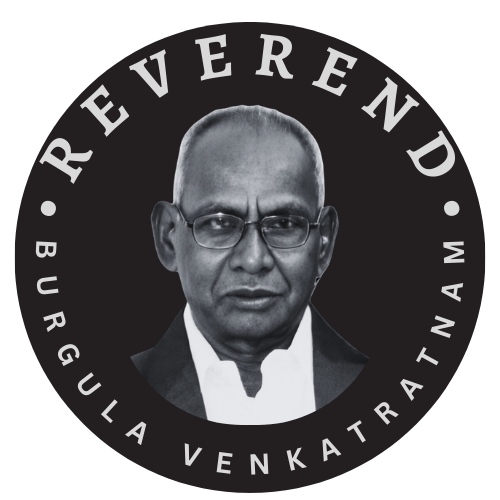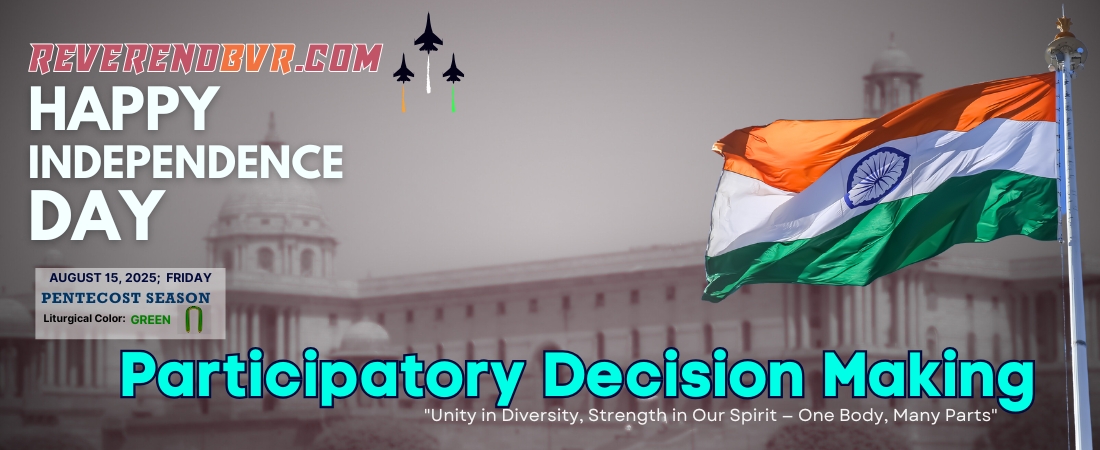In a nation as diverse as India, Christian leadership calls us to embrace participatory decision-making—rooted in Scripture and the Spirit’s guidance—where freedom means sharing responsibility, discerning together, and embodying God’s justice in our communities.
Sermon Title: Participatory Decision Making – A Christian Approach to Leadership and Freedom
Date: Friday, August 15, 2025.
Readings: Exodus 18:13-27 | Psalm 2 | Acts 15:22-29 | Luke 20:20-26.
Website: www.reverendbvr.com
Introduction: Faith and Freedom in the Indian Context
India, the world’s largest democracy, is a land where voices rise from many traditions. As Christians in India, we cherish the values of freedom, responsibility, and communal life—principles rooted not only in our Constitution but also in our Scripture. On days when we reflect on civic responsibility—like Republic Day, Independence Day, or Church anniversaries—we must ask: What does Christian participation mean in a society built on pluralism?
This sermon explores how Christian communities in India can engage in participatory decision-making that reflects both God’s sovereignty and human responsibility. Drawing from biblical narratives and early Church models, we will see how Christian leadership is not about control but about discernment, dialogue, and shared obedience to God’s Spirit.
1. Shared Leadership in Scripture: From Moses to the Apostles
The Bible does not idealize solitary leadership. In Exodus 18:13–27, when Moses was overwhelmed by the burden of judging the people, his father-in-law Jethro advised him to appoint capable men to share the responsibility. This was not mere pragmatism—it was a divinely endorsed principle of distributive authority.
The Hebrew term used for “leaders” (שָׂרִים, sarim) implies structured responsibility—not dictatorship. Similarly, in Numbers 11, the Spirit that was upon Moses was also given to seventy elders, reflecting that leadership is a gift to the community, not the privilege of a few.
In the New Testament, the early Church followed this participatory spirit. In Acts 6:1–7, when conflict arose over the distribution of food to widows, the apostles entrusted the community to select seven leaders. Their decision was grounded in consultation, prayer, and discernment, not top-down decree.
2. God’s Sovereignty and Human Participation: A Divine Partnership
Psalm 24 declares: “The earth is the Lord’s and all that is in it.” God’s authority is total. Yet Scripture also affirms that God chooses to work with and through human beings. This is evident in Genesis 1:26, where God says, “Let us make humankind in our image.” The plural language here opens up theological reflection on relationality and co-agency.
In Acts 15, the Council of Jerusalem faced a critical theological issue: should Gentiles be required to follow the Law of Moses? After prayerful debate, the Church leaders declared: “It seemed good to the Holy Spirit and to us…” (Acts 15:28). This phrase captures the essence of Christian decision-making: not autonomous, not coercive, but Spirit-led discernment within community.
The Swiss theologian Karl Barth emphasized that divine command does not suppress human agency—it awakens it. In India’s synods, councils, and local congregations, this remains true: our participation is not opposed to God’s will—it is a vital part of it.
3. Christian Discernment: Listening as a Spiritual Discipline
In a culture where elders, teachers, and panchayats have traditionally guided decisions, Christian communities can model spiritual discernment rooted in humility and listening. Dietrich Bonhoeffer wrote, “The first service one owes to others is listening.” The Church is not a corporation or political party—it is a body where each member has value (1 Corinthians 12:12–27).
In Acts 1:15–26, before choosing Matthias as Judas’s replacement, the apostles did not campaign or vote. They prayed, named suitable candidates, and cast lots—trusting God to guide the process. It was not about efficiency, but about faithfulness.
For churches in India, whether urban or rural, large or small, this model challenges us to slow down, listen deeply, and allow the Holy Spirit to guide collective wisdom.
4. Faith and Nation: “Render unto Caesar…” in Indian Democracy
Jesus’ words in Luke 20:25, “Render unto Caesar what is Caesar’s, and unto God what is God’s,” have profound implications in a democratic society. As citizens of India, Christians are not called to withdrawal or silence. We are called to active participation in shaping society through truth, justice, and service.
The political theologian Oliver O’Donovan argues that the Church should not be apolitical. It should engage public life, not to gain power, but to bear prophetic witness. In India, where corruption, communalism, and caste discrimination persist, the Church must speak—not from the seat of power, but from the cross of Christ, advocating for the marginalized, the voiceless, and the oppressed.
5. Challenges and Opportunities for the Indian Church
Indian churches often struggle with hierarchical control, whether from clergy, dominant families, or unexamined traditions. Shared decision-making is difficult, especially in diverse communities with caste, linguistic, and gender dynamics.
But Ephesians 4:11–16 calls us to maturity through mutual participation: “Speaking the truth in love, we are to grow up… into Christ.” Growth happens not through uniformity, but through a diversity of voices united in Christ.
The German term Gemeinschaft used by Bonhoeffer reminds us that true Christian community is not built on agreement but on bearing one another’s burdens, forgiving one another, and walking together.
Conclusion: Freedom to Participate, Freedom to Serve
Freedom, in a Christian sense, is not merely freedom from oppression, but freedom for responsibility. It is the freedom to participate in God’s redemptive work in the world, alongside others.
On this national day—or church celebration—may Indian Christians hear anew the words from Acts 15:28: “It seemed good to the Holy Spirit and to us…” This is the model: prayerful discernment, mutual respect, and Spirit-led decision-making.
Let our churches, institutions, and families be places where decisions are made together, under the Lordship of Christ, in the power of the Spirit, and with the goal of building the Kingdom of God in India—a kingdom of justice, mercy, and peace.
Closing Prayer
Gracious God, We thank You for the freedom we have as Your children and as citizens of this great land.
Teach us to listen to one another, to seek Your Spirit in all our decisions, and to reflect Your justice in our homes, churches, and society.
Bless India, bless our Church, and empower us to be humble participants in Your mission.
Through Jesus Christ, our Lord. Amen.
Select Bibliography
- Barth, Karl. Church Dogmatics, Vol. III/4.
- Bonhoeffer, Dietrich. Life Together.
- O’Donovan, Oliver. The Desire of the Nations.
- Zizioulas, John D. Being as Communion.
- Hauerwas, Stanley. The Peaceable Kingdom.
- MacIntyre, Alasdair. After Virtue.
- Sunder Raj, M. Ezra. The Christian Witness in the Indian Context.
- Koyama, Kosuke. Water Buffalo Theology.
© 2025 ReverendBVR.com | High-Academic Sermon Series, 2025.
Content licensed under Creative Commons Attribution-NonCommercial-NoDerivatives 4.0 International (CC BY-NC-ND 4.0). You are free to share — copy and redistribute the material in any medium or format with proper attribution. No commercial use or modifications allowed without explicit permission.
For further sermons and biblical reflections, please visit 🌐 www.reverendbvr.com/sermons

